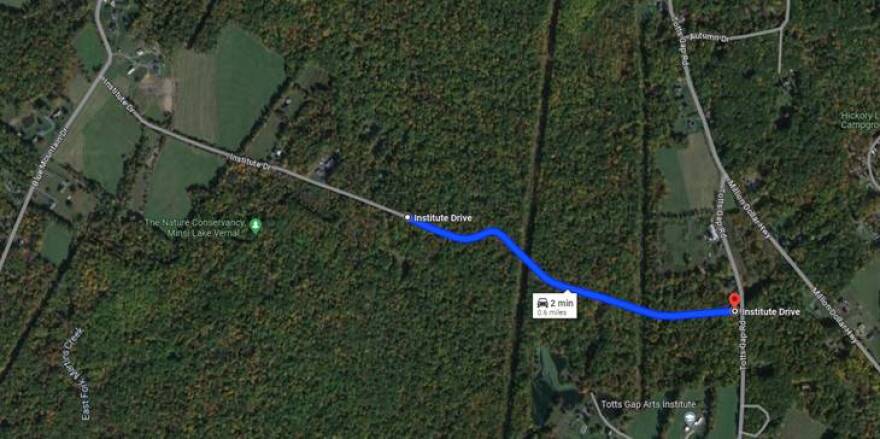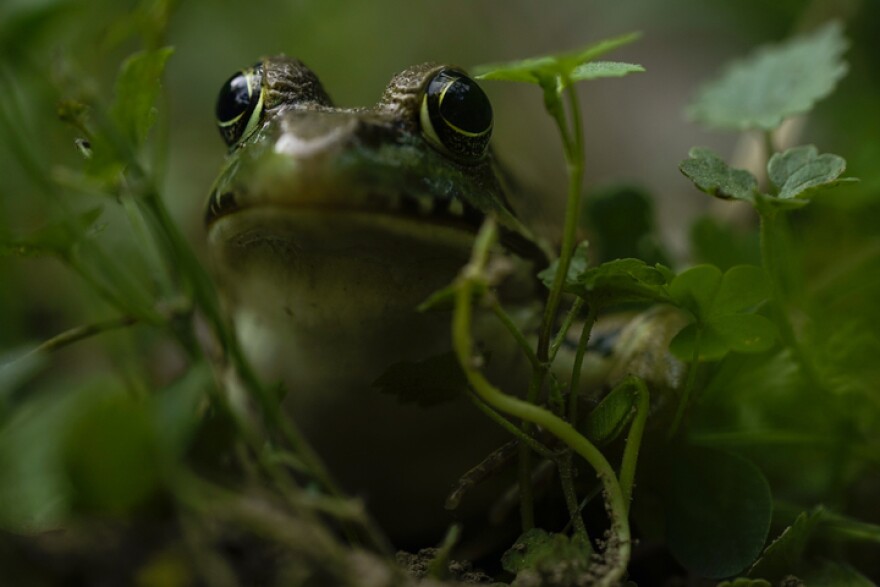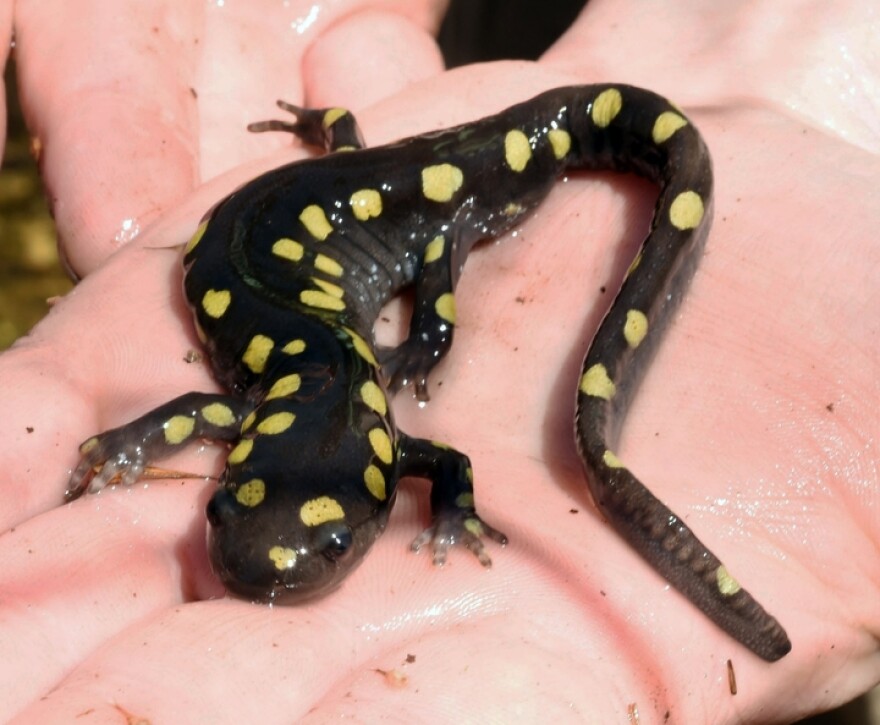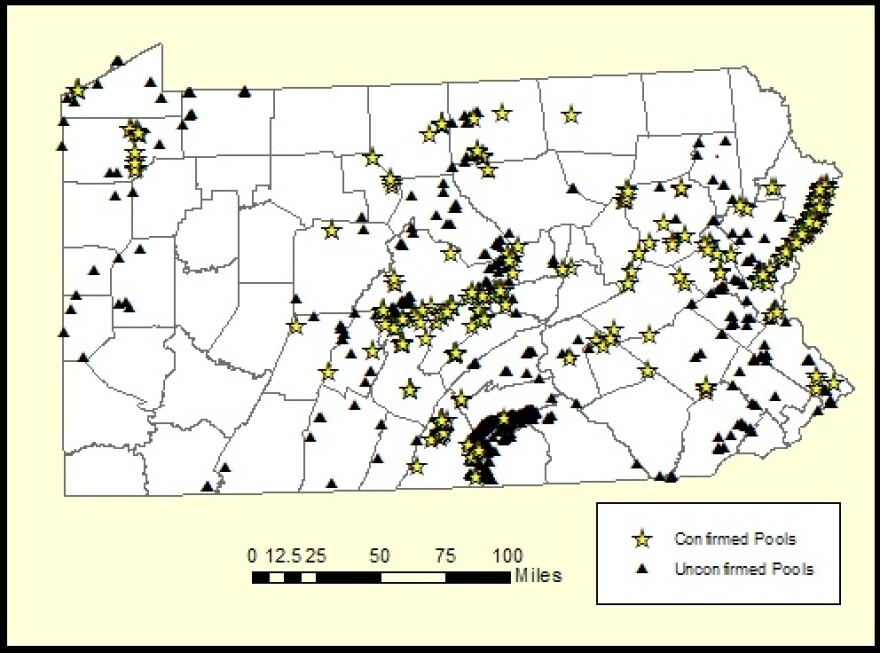UPPER MOUNT BETHEL TWP., Pa. — As winter begins to loosen its grip on the Lehigh Valley, residents can hear it — whether from the birds chirping as they soar from tree to tree or the chorus of spring peepers, a type of frog found in grassy lowlands near ponds and wetlands.
“It wouldn't be spring if you didn't hear that song that [spring peepers] have,” said Renata Platenberg, secretary of the Herpetologists’ League. “That song kind of heralds the end of the snow, because spring peepers are usually the first ones to breed in the spring and there's often snow still in the ground.”
However, these amphibians, as well as many others native to the region, are threatened by habitat loss — so officials have stepped in to help.
Through most of April, a section of Institute Drive will be closed in the Totts Gap Conservation Area, a natural heritage area on the ridgeline of Blue Mountain, straddling the border between Monroe and Northampton counties, to protect breeding amphibians, specifically spotted salamanders, wood frogs and those noisy spring peepers.

Experts said the road-closing conservation effort, while a small nuisance to nearby residents, is not only important for the animals, but also for the region’s overall landscape and ecosystem.
“Recommendations from the County’s Minsi Lake Corridor Greenway & Stewardship plan highlight the need to protect critical landscapes,” said Bryan Cope, Northampton County’s superintendent of parks and recreation, in a news release announcing the closure. “This temporary closure is a major step in the ongoing efforts to provide sustainable conservation practices.”
‘Critically important’
In the woodlands alongside Institute Drive are vernal pools — small, seasonal bodies of water where amphibians go to breed.

Also called seasonal or ephemeral pools, vernal pools are wetlands that fill annually from precipitation, surface runoff and rising groundwater, according to the 2015-2025 Pennsylvania Wildlife Action Plan.
During the brief spring period when pools contain water, they serve as important breeding sites for many amphibian species (e.g., salamanders and frogs); many of which breed solely in vernal pools due to the absence of fish.2015-2025 Pennsylvania Wildlife Action Plan
“Typically through evaporation, these pools become completely dry by late spring or early summer. Because these ponds dry-up, they cannot support fish populations,” according to the plan. “During the brief spring period when pools contain water, they serve as important breeding sites for many amphibian species (e.g., salamanders and frogs); many of which breed solely in vernal pools due to the absence of fish.”

In addition to amphibians, reptiles, dragonflies, damselflies, moths and butterflies “depend on specific wetland habitats for all or a portion of their life cycles.”
Platenberg said vernal pools are “critically important.”
“Vernal pools are also important for migratory birds, and lots of invertebrates use them,” she said. “The concern is, and the reality is, that a lot of these pools are being filled in to make way for parking lots or an agricultural system, stuff like that.”
Wetlands are disappearing statewide.
The commonwealth may have already lost about 56% of its total wetlands since pre-Colonial times, leaving an estimated 404,000 acres, or approximately 1.4% of the state, as wetlands.
Northampton County officials say the woodlands are "home to the largest concentration of natural seasonal pools and associated species of amphibians anywhere" in the state, but LehighValleyNews.com was not able to independently verify this claim.
The Pennsylvania Natural Heritage Program's website does include a Vernal Pool Database, which shows a dense amount of vernal pools in the area.

‘Hundreds of animals on the road’
The closure, which extends west from Totts Gap Road on Institute Drive for about a half-mile, began March 8 and continues through April 29 –- prime breeding weeks for frogs and salamanders.
When temperatures get warmer, hibernation ends and amphibians begin to migrate to vernal pools to breed — but roads, and the motorists utilizing them, can get in the way.
“In the northern hemisphere, mostly, our amphibians are terrestrial,” Platenberg said. “They live on the land — they move around in the summer, fall and winter, on land. And then in the spring, they make these migrations to water, because they have to lay their eggs in water. They've been doing this forever — millennia.
“And when we slap a road down, we don't really think, we haven't really thought about what the impacts will be to natural populations.”
For half a century, officials have highlighted the perils to amphibians roads can incur, she said. In the 1970s, it wasn’t unusual for motorists to “drive through these streams of frogs — just mass slaughter.”
While all three of the species targeted for the closure are listed as “abundant” by the state Fish and Boat Commission, any efforts to protect them are important, experts said.
“It's also an ethical thing, too. When those animals are migrating, there can be hundreds of animals on the road,” said Platenberg, adding that amphibians are one most rapidly declining groups of organisms on Earth due to habitat loss and disease.
“They're battling. So, any measure that we can take to enable them to get to their breeding ponds and produce offspring, we should do it.”


